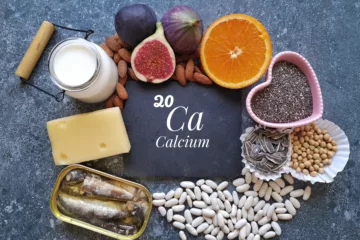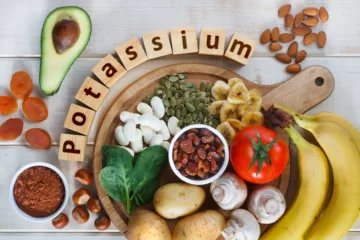Inflammation is a natural process that happens in the body to protect itself from harm, such as injury or infection. However, when this process becomes chronic, it can lead to serious health problems, such as heart disease, diabetes, arthritis, and some types of cancer. Diet plays a significant role in the development of chronic inflammation, and certain foods can trigger it. In this article, we will discuss 23 foods that cause inflammation and explore ways to combat it.
What is inflammation and why is it harmful to your health?
When your body is injured or exposed to infection, it produces inflammation to protect itself and initiate the healing process. The immune system sends white blood cells to the area of injury or infection, which release chemicals that cause blood vessels to dilate and become more permeable. This allows nutrients and immune cells to reach the site of injury or infection, and the damaged tissue can be repaired. However, when the inflammation process becomes chronic, it can lead to long-term damage, and the body begins to attack healthy tissue resulting in a range of health problems.
Chronic inflammation has been linked to a variety of health conditions, including heart disease, diabetes, arthritis, and even cancer. It can also contribute to the aging process and cognitive decline. Lifestyle factors such as poor diet, lack of exercise, and stress can all contribute to chronic inflammation. It’s important to take steps to reduce inflammation in the body, such as eating a healthy diet rich in anti-inflammatory foods, getting regular exercise, and managing stress levels.
How does diet impact inflammation in the body?
Research has shown that diet plays a crucial role in regulating inflammation levels in the body. Many foods that are high in sugar, saturated and trans fat, and refined carbohydrates can provoke inflammation. On the other hand, foods high in antioxidants, fiber, and essential fatty acids can help reduce inflammation.
One study found that a Mediterranean-style diet, which is rich in fruits, vegetables, whole grains, and healthy fats, can significantly reduce inflammation markers in the body. Another study showed that consuming a diet high in omega-3 fatty acids, found in fatty fish like salmon and sardines, can also help reduce inflammation.
It’s important to note that everyone’s body is different, and what works for one person may not work for another. It’s best to work with a healthcare professional or registered dietitian to determine the best diet plan for your individual needs and health goals.
Understanding the link between inflammation and chronic diseases
Chronic inflammation is a significant contributor to many diseases such as heart disease, Alzheimer’s disease, and cancer. Many lifestyle factors such as diet, lack of exercise, smoking, stress, and pollution can trigger chronic inflammation. Reducing inflammation is key to the prevention and treatment of these conditions.
Research has shown that certain foods can help reduce inflammation in the body. These include fruits and vegetables, whole grains, nuts, and fatty fish. On the other hand, processed foods, sugary drinks, and red meat can increase inflammation. Incorporating an anti-inflammatory diet can not only help prevent chronic diseases but also improve overall health and well-being.
The role of processed foods in causing inflammation
Processed foods are often high in sugar, salt, and unhealthy fats. These components can trigger inflammation in the body, contributing to chronic inflammation. Foods such as cakes, pastries, confectionery, and fried foods are examples of processed foods that have a high inflammatory impact.
In addition to the high levels of sugar, salt, and unhealthy fats, processed foods also often contain additives and preservatives that can contribute to inflammation. These additives, such as artificial colors and flavors, can cause an immune response in the body, leading to inflammation. It is important to limit the consumption of processed foods and opt for whole, nutrient-dense foods to reduce the risk of chronic inflammation and related health issues.
The dangers of consuming too much sugar for inflammation
Sugar is one of the leading causes of inflammation. Studies have shown that a diet high in sugar can lead to inflammation in the body. Sugar is found in many foods, including sweetened beverages, baked goods, fruit juices, and candy. Consuming these foods in large quantities can increase inflammation levels in the body.
Inflammation is a natural response of the body to injury or infection, but chronic inflammation can lead to various health problems such as heart disease, diabetes, and cancer. Consuming too much sugar can also lead to weight gain, which is another risk factor for inflammation. Therefore, it is important to limit your intake of sugary foods and opt for healthier alternatives such as fruits, vegetables, and whole grains.
Why refined carbohydrates are linked to inflammation and how to avoid them
Refined carbohydrates are quickly absorbed into the bloodstream, causing a spike in blood sugar levels, which can trigger inflammation. Examples of refined carbohydrates include white bread, pasta, and many processed snacks. To avoid inflammation from refined carbohydrates, opt for whole grains, which are rich in fiber.
In addition to causing inflammation, refined carbohydrates have also been linked to an increased risk of type 2 diabetes and heart disease. This is because they are often high in calories and low in nutrients, leading to weight gain and other health issues.
One way to avoid refined carbohydrates is to focus on eating a diet rich in fruits, vegetables, and lean proteins. These foods are not only low in refined carbohydrates but also provide essential vitamins and minerals that are important for overall health.
The impact of unhealthy fats on increasing inflammation levels
Unhealthy fats such as trans fats and saturated fats increase inflammation levels in the body. These fats are found in many fried and processed foods, as well as red meat and dairy products. To reduce inflammation, opt for healthy fats such as nuts, seeds, and fish.
Inflammation is a natural response of the body to injury or infection. However, chronic inflammation caused by unhealthy fats can lead to serious health problems such as heart disease, diabetes, and cancer.
Studies have shown that a diet high in fruits, vegetables, and whole grains can help reduce inflammation levels in the body. Additionally, regular exercise and stress management techniques such as meditation and yoga can also help reduce inflammation.
How consuming too much red meat can cause inflammation
Red meat is a significant source of saturated fat, which can trigger inflammation in the body. Studies have shown that those who consume a diet high in red meat are at a greater risk of developing inflammation-related conditions, such as heart disease and cancer.
In addition to saturated fat, red meat also contains high levels of heme iron, which can contribute to oxidative stress and inflammation in the body. This can lead to damage to cells and tissues, increasing the risk of chronic diseases.
However, it’s important to note that not all types of meat have the same effect on inflammation. Leaner cuts of meat, such as chicken and fish, are lower in saturated fat and heme iron, making them a healthier choice for those looking to reduce inflammation in their diet.
The link between dairy products and inflammatory conditions
Dairy products contain several components that can cause inflammation, including lactose, casein, and saturated fat. Some people are also intolerant to dairy, leading to inflammation. You can reduce inflammation by opting for plant-based alternatives such as nut milk and soy products.
Research has also shown that consuming high amounts of dairy products can increase the risk of developing certain inflammatory conditions, such as arthritis and asthma. This is because dairy products can trigger an immune response in some individuals, leading to inflammation in the body. It is important to note that not everyone will experience these effects, and moderation is key when it comes to consuming dairy products.
How gluten triggers inflammation in sensitive individuals
Gluten is a protein found in wheat, barley, and rye. Some individuals are sensitive to it, leading to inflammatory bowel disease. Consuming gluten-free grains such as quinoa and brown rice is preferred for individuals who are sensitive to gluten.
When gluten is consumed by sensitive individuals, it triggers an immune response in the body. This immune response can cause inflammation in the gut, leading to symptoms such as bloating, diarrhea, and abdominal pain. In some cases, this inflammation can also lead to damage to the lining of the small intestine, which can cause malabsorption of nutrients.
It is important for individuals with gluten sensitivity to read food labels carefully, as gluten can be found in many unexpected foods such as sauces, dressings, and even some medications. Working with a registered dietitian can also be helpful in developing a balanced and nutritious gluten-free diet.
Alcohol consumption and its effect on triggering inflammation
Excessive alcohol consumption can increase inflammation levels. Alcohol can also damage the gut lining, leading to increased inflammation. To reduce inflammation, it is best to consume alcohol in moderation or eliminate it entirely.
Furthermore, alcohol consumption can also weaken the immune system, making it more difficult for the body to fight off infections and illnesses. This can lead to a higher risk of developing chronic diseases such as liver disease, heart disease, and certain types of cancer. It is important to be mindful of the amount of alcohol consumed and to prioritize overall health and wellness.
Why artificial sweeteners can cause inflammation in the body
Artificial sweeteners can lead to inflammation in the body. These sweeteners are found in many diet products, which people often consume to avoid sugar to reduce inflammation. Instead, natural sweeteners such as honey and maple syrup can be used.
One of the reasons why artificial sweeteners can cause inflammation is because they disrupt the balance of gut bacteria. Studies have shown that these sweeteners can alter the composition of gut microbiota, leading to an increase in harmful bacteria and a decrease in beneficial ones. This imbalance can trigger an inflammatory response in the body.
Another reason why artificial sweeteners can cause inflammation is because they activate the immune system. When the body detects something foreign, such as an artificial sweetener, it triggers an immune response to protect itself. This immune response can lead to inflammation, which can cause damage to tissues and organs over time.
The dangers of consuming high amounts of fried or grilled foods
Fried and grilled foods, such as french fries, potato chips, and burgers, contain high levels of unhealthy fats, which can trigger inflammation. To reduce inflammation levels, avoid fried and grilled foods, and instead opt for baked or steamed foods.
In addition to causing inflammation, consuming high amounts of fried or grilled foods can also increase the risk of developing heart disease. The high levels of unhealthy fats found in these foods can lead to the buildup of plaque in the arteries, which can eventually lead to heart attacks or strokes.
Furthermore, fried and grilled foods are often cooked at high temperatures, which can create harmful compounds such as acrylamide and polycyclic aromatic hydrocarbons (PAHs). These compounds have been linked to an increased risk of cancer, particularly in the colon, breast, and prostate.
How food additives and preservatives can contribute to chronic low-grade inflammation
Many food additives and preservatives are used in processed foods to enhance their flavor and shelf life. Research has shown that these additives can cause chronic low-grade inflammation, leading to long-term health problems. To reduce inflammation, try to avoid processed foods whenever possible and opt for whole, natural foods.
Some common food additives and preservatives that have been linked to inflammation include monosodium glutamate (MSG), high fructose corn syrup, and artificial sweeteners. These ingredients are often found in processed snacks, sodas, and other packaged foods. In addition to causing inflammation, they can also contribute to weight gain and other health issues. By reading food labels and choosing foods without these additives, you can help reduce your risk of chronic inflammation and improve your overall health.
The impact of trans fats on increasing inflammatory markers in the body
Trans fats are a type of unhealthy fat that can increase inflammation levels in the body. Trans fats are commonly found in fried foods, snack foods, and baked goods. To reduce inflammation, avoid foods that contain trans fats and opt for healthier fats such as nuts, olive oil, and avocados.
Studies have shown that consuming trans fats can also increase the risk of developing heart disease, stroke, and type 2 diabetes. This is because trans fats can raise bad cholesterol levels and lower good cholesterol levels in the body.
In addition to avoiding trans fats, incorporating anti-inflammatory foods into your diet can also help reduce inflammation levels in the body. Examples of anti-inflammatory foods include leafy greens, berries, fatty fish, and turmeric.
Foods that can naturally reduce inflammation levels in the body
Some foods have anti-inflammatory properties, including omega-3 fatty acids, fruits, vegetables, and spices. Including these foods in your diet can help reduce inflammation levels and promote overall health.
Research has shown that consuming a diet high in processed foods, refined sugars, and unhealthy fats can increase inflammation levels in the body. In contrast, a diet rich in whole, nutrient-dense foods can help reduce inflammation. Some examples of anti-inflammatory foods include fatty fish like salmon, leafy greens like spinach and kale, berries like blueberries and strawberries, and spices like turmeric and ginger. By incorporating these foods into your diet, you can help support your body’s natural anti-inflammatory processes and improve your overall health.
Anti-inflammatory diets: what to eat and what to avoid
An anti-inflammatory diet includes foods that help reduce inflammation levels in the body and avoids foods that increase inflammation. This diet includes plenty of fruits, vegetables, whole grains, legumes, and healthy fats, such as those found in salmon and nuts. It is best to avoid processed foods, fried foods, and foods high in sugar.
In addition to the foods mentioned above, an anti-inflammatory diet also includes spices and herbs that have anti-inflammatory properties, such as turmeric, ginger, garlic, and cinnamon. These can be added to meals to enhance their flavor and provide additional health benefits.
Research has shown that following an anti-inflammatory diet can have numerous health benefits, including reducing the risk of chronic diseases such as heart disease, diabetes, and certain types of cancer. It can also help improve joint health and reduce inflammation-related pain and discomfort.
A sample meal plan for an anti-inflammatory diet
A sample meal plan for an anti-inflammatory diet could include a breakfast of steel-cut oats, berries, and almond milk. For lunch, you could have a salad with mixed greens, grilled chicken, avocado, and olive oil dressing. For dinner, you could have grilled salmon, roasted sweet potatoes, and steamed broccoli.
It is important to note that an anti-inflammatory diet is not just about what you eat, but also about what you avoid. Foods that are high in sugar, saturated fats, and processed ingredients should be limited or avoided altogether. This means cutting back on sugary drinks, processed snacks, and fried foods. Instead, focus on whole, nutrient-dense foods like fruits, vegetables, lean proteins, and healthy fats.
Supplements that can help reduce inflammation levels in the body
Some supplements can help reduce inflammation levels in the body, including omega-3 fatty acids, turmeric, and probiotics. As with any supplements, it is essential to speak to a healthcare provider before adding them to your diet.
Omega-3 fatty acids are found in fish oil supplements and have been shown to have anti-inflammatory effects. They can help reduce inflammation in the body and may also have other health benefits, such as improving heart health and brain function.
Turmeric is a spice commonly used in Indian cuisine and has been used for centuries in traditional medicine. It contains a compound called curcumin, which has anti-inflammatory properties. Turmeric supplements are available in capsule form and can be a helpful addition to a healthy diet.
Lifestyle changes that can help manage chronic inflammatory conditions
Exercise, stress management, and getting adequate sleep can help reduce inflammation levels in the body. Other lifestyle changes, such as quitting smoking and avoiding pollution, can also help reduce inflammation levels.
In addition to these lifestyle changes, maintaining a healthy diet can also play a significant role in managing chronic inflammatory conditions. Consuming foods that are rich in antioxidants, such as fruits and vegetables, can help reduce inflammation levels in the body. On the other hand, consuming processed foods and foods high in sugar and saturated fats can increase inflammation levels.
Another lifestyle change that can help manage chronic inflammatory conditions is practicing mindfulness and relaxation techniques. Activities such as yoga, meditation, and deep breathing exercises can help reduce stress levels, which in turn can help reduce inflammation levels in the body.
How stress management techniques can help reduce overall levels of inflammation
Stress is a significant contributor to inflammation. Practicing stress management techniques such as yoga, meditation, and deep breathing can help reduce inflammation levels and promote overall health.
Studies have shown that chronic stress can lead to long-term inflammation, which can increase the risk of developing chronic diseases such as heart disease, diabetes, and cancer. By incorporating stress management techniques into your daily routine, you can help reduce inflammation levels and improve your overall health. Additionally, these techniques can also help improve your mood, increase your energy levels, and enhance your overall sense of well-being.
Conclusion: taking control of your diet to manage chronic conditions caused by inflammation
Diet plays a crucial role in the development of chronic inflammation, but it also offers a solution. Making the right food choices, such as eating a diet rich in fruits, vegetables, and healthy fats, can help reduce inflammation levels in the body and promote overall health. By adapting a healthy lifestyle and avoiding foods that cause inflammation, you can take control of chronic inflammatory conditions and improve your overall health.
It is important to note that while diet can be a powerful tool in managing chronic inflammation, it should not be the only approach. Other lifestyle changes, such as regular exercise, stress management, and getting enough sleep, can also play a significant role in reducing inflammation levels in the body.
Additionally, it is important to work with a healthcare professional to develop a personalized plan for managing chronic inflammatory conditions. They can provide guidance on specific dietary changes, as well as recommend other treatments or medications that may be necessary to manage symptoms and prevent further inflammation.










